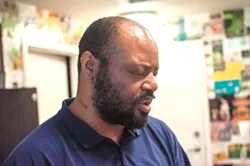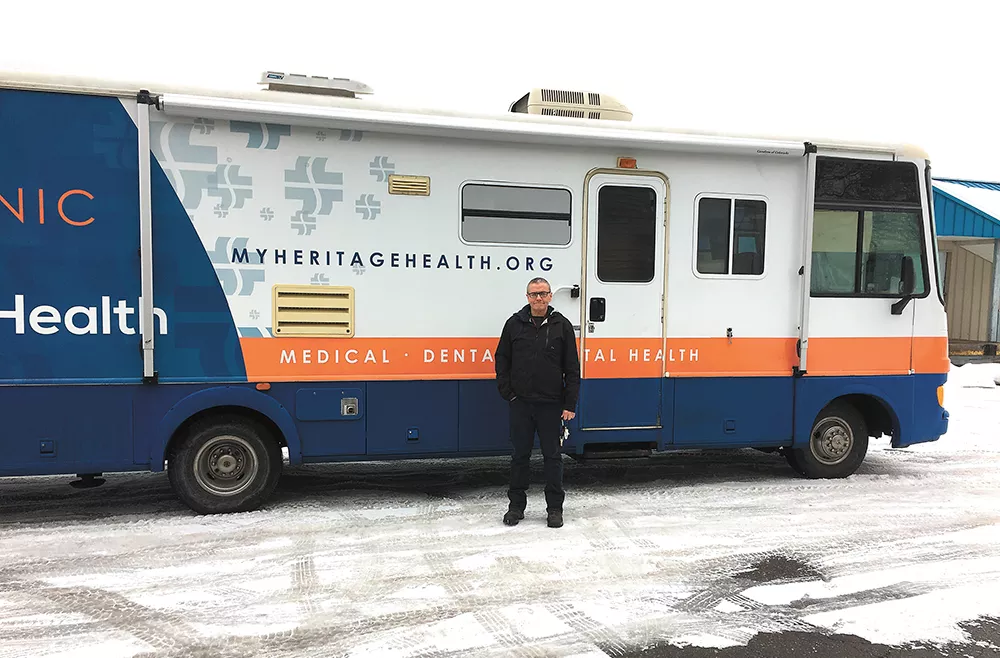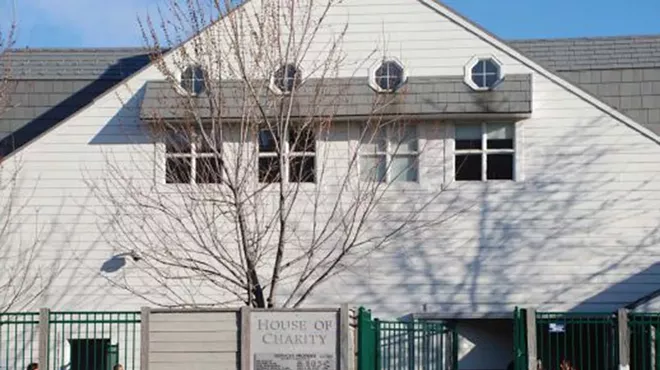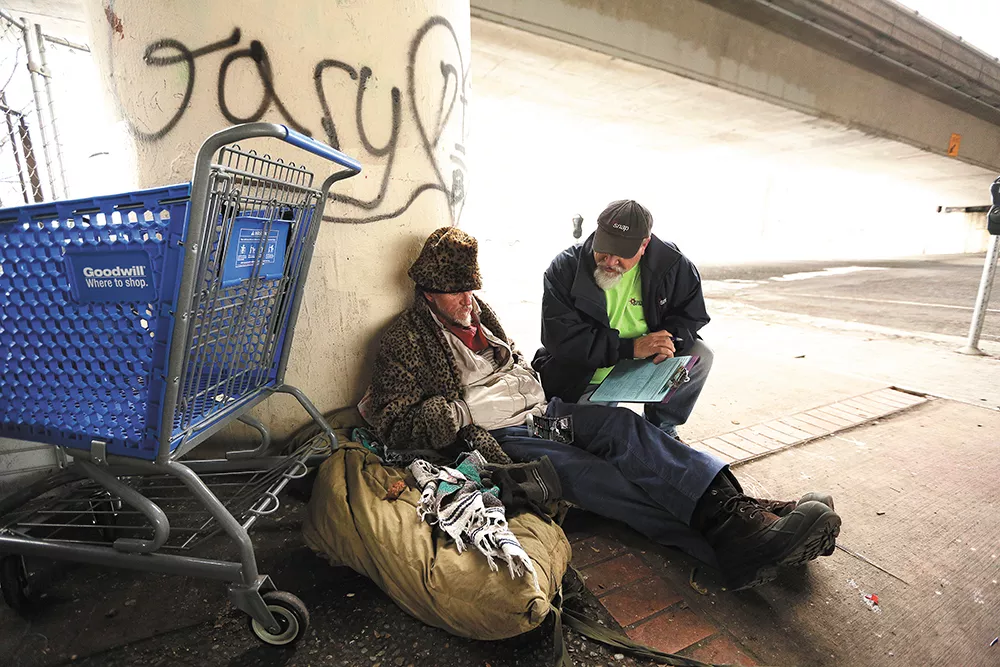
Homelessness is snuggling under a pile of blankets with two other people to stay warm, and it's using meth to stay awake, so you don't freeze to death in your sleep.
Homelessness is teasing the downtown cop you know by name, and it's being arrested on a warrant at a substance abuse clinic.
Homelessness is digging through dumpsters for food, and it's smoking half-burned cigarettes you found on the ground.
And homelessness is nearly a thousand separate stories that we as a community listen to once a year, in the dead of winter. Last week, volunteers, advocates and outreach workers scoured the shelters and searched under freeways, in the library, the bus plaza and wherever else Spokane's homeless population frequents, trying to tally who exactly the region's homeless are.
"Once you get to know the reality of the homeless population," says Rob McCann, director of Catholic Charities, "you will never again think it's their own fault."
Back in 2011, amid the recession — as unemployment drove some Spokane residents to the streets and budget cuts threatened to shutter shelters — the possibility of dramatically reducing homelessness in Spokane looked bleak, almost impossible. Even McCann scoffed at then-President Barack Obama's dream of ending homelessness within a decade.
"That may have made great fodder for a speech by a politician trying to get elected, but it's not reality," McCann told the Inlander then. "You're not going to end homelessness in 10 years."
A half-dozen years later, that reality has changed. Today, McCann is the voice of optimism. He speaks with a rapid passion as he puts forth a radical notion: Homelessness can be beaten.
"This is not a problem that is unsolvable. Most people look at homelessness and say, 'Ah, you'll never solve it. You're never going to solve peace in the Middle East. You'll never solve hunger in Africa. You're never going to solve homelessness in Spokane,'" McCann says. "These problems are not the same. We can solve homelessness in Spokane."
Not only that, but he believes it can be largely solved in the next three years.
"Let's say there's 350 chronically street-homeless men and women in Spokane," McCann says. "We endeavor to build an apartment for every one of them by 2020."
He's not ready to say that homelessness can be ended, but he believes there will come a time where shelters like Catholic Charities' House of Charity will see attendance dwindle, as more and more of the homeless are given homes. Local advocates have their eye on "functional zero," where the moment someone becomes homeless, the community floods them with resources to immediately find them a home again.
In the past two years, McCann says, Spokane has been at a crossroads: It could go the way of Seattle, where more than 300 members of the city's homeless population have set up camp amid the rats and needles and garbage heaps underneath the I-5 freeway. Despite the booming economy and liberal populace, sky-high property values make building housing for the homeless nearly impossible.
Instead, Spokane has tried to attack homelessness while it still has a fighting chance. That's meant an alliance between charities, hospitals, business groups, the Spokane Housing Authority and advocates.
"We decided, if we can beat this, we can do it now," McCann says.
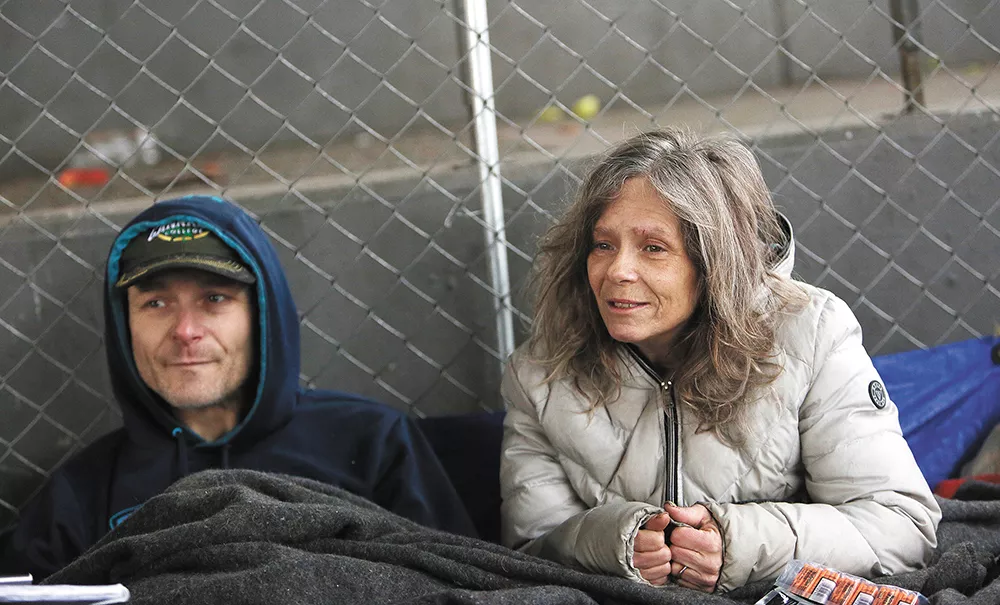
It's meant gathering immense amounts of data to understand the shape of homelessness in Spokane. It's meant — just this winter — dramatically expanding the amount of space in the shelters and ensuring that shelters are open every hour of every day of the week.
And, crucially, it's meant giving the homeless homes.
McCann points to the poster boards scattered about his office, renderings of apartment complexes aimed at housing the chronically homeless. Catholic Charities has already built three, and three more are under construction or completely funded.
"We're not just dreaming or hoping or praying, 'Oh, gosh, I hope we build these buildings.' We're doing it," McCann says. "Imagine how many cities in the United States would kill to be able to say we are sheltering every homeless person in the community?"
SEARCHING FOR THE HOMELESS
The Point-In-Time count of the homeless, held every January, will always be imperfect. The numbers can be dramatically impacted by the weather, by the amount of shelter space available, even by what the House of Charity is offering for lunch that day. Last year, the county found 981 homeless people. But the point of the count isn't just to determine the number of homeless, which has been steadily decreasing in the past five years. The point is to find out who they are and to catalog their stories.
An outreach team sets out from Crosswalk — a shelter for homeless youth in downtown Spokane — and heads straight for the STA bus plaza, armed with blue Point-In-Time count forms.
Almost immediately, the team finds Matthew Bancroft, a homeless 19-year-old at the STA Plaza.
One of the outreach team members begins running through the questions. Where did you stay last night? In a vehicle? An abandoned building? On the streets?
What caused your homelessness? Eviction? Domestic violence? Drug use? Family rejection? Aged out of foster care?

Bancroft describes a childhood spent running away from foster homes — like the one where the fridge holding the good food was padlocked — and sleeping in a park or on the benches at the train station. He describes nights where he walked hours, alone, to get to a friend's house where he could crash.
"The community basically raised me," Bancroft says.
His 1-year-old son, Jacob, munches on peanut butter Ritz crackers in his stroller.
"I don't get visits with him very much because I'm always struggling," Bancroft says.
Meanwhile, other volunteers stop in at the Spokane Public Library a few blocks away and interview Adam Jones. His questionnaire answers are often broken up by bouts of laughter; he assures everyone he's actually 33, despite his low, gravelly voice and collection of walking canes.
While he's now on the street, he's previously lived for more than a year in a modified school bus, complete with two wood-burning stoves, with his family as a "retreat." He has "something stupid like 29" bikes which he uses to exercise, and he volunteers at Mosaic Community Bike Shop fixing bikes. He jokes about being a dirty hippie.
"I get the urge to be bitter sometimes," Jones says. "But I still think there's a lot of happiness to be found in Spokane."
There's been a lot of sadness, too. He lost his home gradually after his friends took advantage of him, he says. His wife, Jewelya, died of a heart infection. Their daughter, Dayvey, now 4, went to live with his wife's friend.
Last August, he says, he was about six months out from graduating from his homebuilding journeyman program when he was literally blindsided — hit by a car while riding his bike. He sustained a severe concussion and soft tissue damage, and still suffers from double vision, memory trouble and chronic headaches.
Still, he wants to finish up his degree. He wants to get housing. He wants, someday, to take his daughter to Disney World. At least, he says, he and Dayvey hang out every week. But so far, he hasn't revealed that he's homeless.
"I say, 'Daddy's at work,'" Jones says. "That's all I can really say."
For Bob Peeler, a housing specialist for SNAP (Spokane Neighborhood Action Programs), the effort concentrated in the Point-In-Time count is like almost every other day. He's been doing this kind of thing for decades — checking on people who he knows slept outside the night before. Early on the day after Spokane's official count, he finds Bill and Linda Skelton snuggled under six blankets and three sleeping bags on a sidewalk under the freeway. The words "NO TRESPASSING" are spray-painted on the concrete wall right behind them.
People know them as Mom and Pop. Or as BillAndLinda. One word. They're always together. They've been trying to get into a place of their own for nearly five years. But according to the housing assessment tool that Peeler uses at SNAP, that means they're not homeless enough. People who have been on the streets for 10 or 15 years, for example, are given priority. An addiction or mental health issue gives a person priority as well.
That's one thing Peeler says he might change about housing assessments. It would be helpful if there was a way to calculate the likelihood of a person's success once they get into an apartment.
By the time Peeler encounters the couple, the cops have already come through. Bill and Linda have an hour to pack up their stuff and move on. That happens pretty regularly, they say.
"We can't sit, stand, lie or anything," Linda says. "We have to always be moving, otherwise we get a ticket."
Bill and Linda are not homeless by choice.
"We're trying like heck right now to get some kind of help through SNAP," Bill says. "I'm to the point now where I'm getting scared, because I really need help."
Doctors say that Bill needs hip surgery, but making it to appointments on time is impossible. Even the walk to the House of Charity shelter a few blocks away is excruciating, and Linda does most of the work packing up their camp. Without her, he'd be in much worse shape, Bill says.
"So that's why we're out here," Linda says. "So we can be together."
For money, Bill fixes old, broken phones and sells MP3 players loaded with music. Some days, he says, he can make $200; other days, he doesn't make a dime.
Bill doesn't shy away from his past. He says he could have made better choices as a young man. Twenty-five years ago, when they got married, Linda saved him.
"I'm glad, because I was on a path to destruction before," Bill says. "When I met her, I saw something that was worth becoming better for."
Linda rests her head on his shoulder.
"The biggest thing I can say is, some people out here don't want anything else but this kind of life, and that's not us," Bill says. "Since day one, I've been trying to figure out how to get out of it."
THE HUDDLED MASSES
It's almost 6 pm this past Thursday, and dozens of homeless men and women are gathered outside the gates of the House of Charity, lugging their backpacks and holding their cats and dogs.
The House of Charity had recently suffered its second norovirus outbreak — an illness that includes diarrhea and projectile vomiting. Truth Ministries, another homeless shelter, has become an ad hoc quarantine space, but for now most of the volunteers have white masks over their faces. Most of the homeless people outside the gates don't have masks, but they come here anyway, because this place is warm and safe.
Suzann Calvert, 39, stands outside, waiting to get in.
"I've been runnin' from my old man about nine months. He drug me down the river, hit me in the face with a gun," Calvert says. "[The domestic violence] shelter's full. They told me to go to the homeless shelter."
She estimates that about half of the women waiting at the gates here have stories like hers.
"Most of us women out here — and even quite a few of the men — are getting beat up," Calvert says. "You know what I mean?"
Homelessness is switching up the spot by the river where you sleep every night, believing that if your abusive boyfriend ever catches you, he'll kill you. But tonight, Calvert says, it's too cold to sleep outside, so she's come here.
At one time, there wouldn't have been room. At one time, if you weren't inside by 8 pm, you'd lose your spot. At one time, only men could sleep here. That all changed in November.
It took help from the city and an alliance of social service providers — including Catholic Charities, Volunteers of America, Family Promise and the Salvation Army — to pull it off, but they did it: a shelter network all day and night, every day of the week.
Beyond the 108 beds upstairs, the floor downstairs is covered in hundreds of blue mats — the type you might use for yoga. The numbers of homeless people who responded astounded House of Charity's director, Sam Dompier.
"We're sleeping almost three times as many people than we've slept in October," she says. "I've had no idea where these people are coming from."
Some nights, more than 100 people are sleeping in the beds upstairs at the House of Charity, with another 200 on the mats downstairs. It doesn't matter if you're high or drunk or mentally ill — as long as you're not disruptive, you can sleep here.
Even though the lights are still on, men — and women, in their own separate area — are already beginning to unroll their sleeping bags, take off their boots and turn in for the night.
"They pack 'em in here," says Scott Conlee, a 63-year-old who, before he retired, worked at a metal stamping plant in Alabama making parts for Kia automobiles. "It's a heck of a service for the community."
He says it's his first time ever staying in a homeless shelter.
"I've always been a responsible, taxpaying citizen. My wife was a retired teacher. I made good money. So this is a shock," Conlee says. "I'll handle it. I don't have a choice. I will do the best with what I have. I always have."
The House of Charity is not just a place to crash. Everyone, from the janitor on up, is here trying to build relationships with the homeless. There are people here to help them get Social Security income, food stamps, job training or an education. And best of all, the "coordinated assessment" program helps connect the homeless with housing.
But there's a catch to all of this. The city has been concerned that the money for the 24/7 shelter program runs out in May.
"We're not going to wait until May," Catholic Charities' McCann says. "In May, when it's 60 degrees and the flowers are blooming, the people are going to care a little less."
For now, until more of the homeless are housed, McCann says, it will take about $2 million a year in extra funding to keep all of the 24/7 shelters up and running. But he says that if Spokane County and Spokane Valley chip in, as well as the city, that's just a drop in their massive budgets.
Ultimately, McCann urges local governments to look at the numbers. It only costs the House of Charity $7.22 a night to shelter the homeless, versus the astronomical bill for treating those without shelter.
"We had a guy who went to the ER 63 times in one year. Sixty-three 911 calls — ambulance, fire truck, police all roll. That adds up to tens of thousands a dollars a year," says McCann. The next year, when the man was placed in one of the housing units, he only went to the ER twice.
"Forget about humanity and human dignity and compassion," McCann says. "Let's make this a math argument."
THE FEW WHO REFUSE
It's nearing midnight at the viaduct on Browne Street, near Pacific Avenue downtown. Cars zoom by at rhythmic intervals. The Burlington Northern train rumbles overhead. And on the trash-strewn sidewalks below, on top of a sheet of plywood, a pile of blankets shifts as the people sleeping beneath it move.
The House of Charity is only 100 feet away. There's plenty of space available. But a few people still choose to sleep outdoors.
"We have some folks who, no matter what, they'll stay out. They'll sleep underneath the overpass, even though it's 15 degrees or less out there," says Bob Cepeda, part of the House of Charity's security team. "And you try to convince them to come in, and they don't want anything to do with it."
Still, he tries. During the day, Cepeda approaches Sid, a homeless man sitting a few blocks from the viaduct. Cepeda kneels down, and after a couple of minutes, Sid tells Cepeda he'll stay at the shelter.
But minutes later, Sid tells a different story to the Inlander. He won't be staying at the House of Charity that night.
"I don't stay at the shelter," he says. "I camp out."
For Catholic Charities, those who refuse help and shelter can be a source of significant frustration. It's why, even though McCann doesn't always like the city's prohibition against sitting and lying on downtown sidewalks, he's asked the city to enforce it under the viaduct.
"At this point, when it's this cold, the only reason someone would refuse to come inside is they're probably struggling with a mental illness," McCann says. "Really, what they need is mental health care."
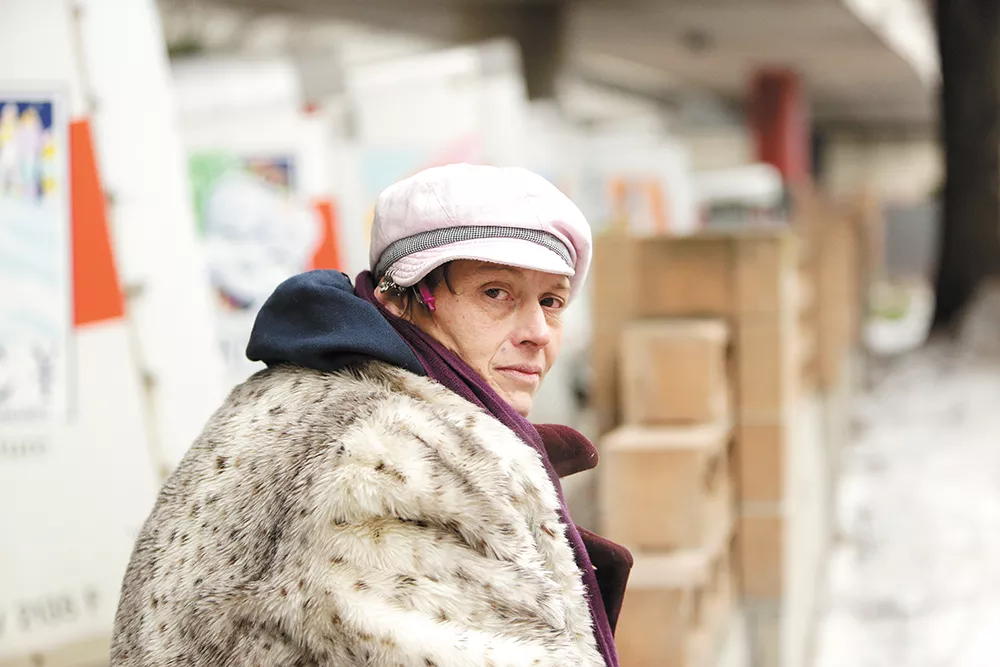
With time, homelessness changes a person. And for some people, homelessness becomes home.
For at least 16 years, according to neighbors, a man — with a guitar and a sleeping bag — has lived in the woods near the house of Ryan Oelrich, chair of the Spokane Homeless Coalition.
The man is older. He's a veteran. He wears the same sweater and bicycle helmet every day, riding into town to the soup kitchen for food before heading back to his campsite.
A decade ago, when Oelrich moved into his house, the man in the woods came and introduced himself. Sometimes he leaves a neat bundle of trash by Oelrich's house for him to throw away. The man never leaves a mess at his campsite. He uses emergency blankets and five sleeping bags to weather the single-digit temperatures.
When they first met, Oelrich had the same kind of thoughts anyone working in social services might have: This man should not be living in the woods. This man needs to be housed. This man needs an apartment. Oelrich offered those things to him, again and again. The man refused.
"That's not what makes him happy," Oelrich says.
Ultimately, Oelrich doesn't think it's possible to end homelessness for all people. Some are too broken; some recover.
McCann has seen this sort of thing before. Two years ago, Catholic Charities gave a fully furnished West Central duplex unit, rent-free, to a Vietnam veteran with post-traumatic stress disorder. The vet had spent a decade living on the streets.
Having a home was a culture shock.
"He slept in the backyard for the first four months," McCann says. "Then we finally got him to sleep on the back porch. Major victory. Then we got him to sleep on the kitchen floor. Major victory. And about nine months in, he slept in the bed for the first time. That bed was there the whole time."
He just couldn't get his mind around sleeping indoors.
That, McCann says, is the type of person choosing to stay beneath the viaduct. This is why, for those like Oelrich and McCann, it's so important to prevent homelessness from happening at all.
HOME AT LAST
Unlike many of the other people in this story, Volando Peeples is not homeless. Not anymore. He says his days of couch-hopping are done.
Peeples, 42, has one of the 51 apartments in Catholic Charities' Buder Haven apartment complex. It's his own space, one he's decorated with comic books and issues of Dope magazine. On one wall, Peeples has posted years of poetry, prose and rap lyrics, all laminated. He points to a particular favorite — a poem, illustrated with a sketch of Jesus, that he wrote back when he was in the county jail.
"It reminds me every time when I sin, we share tears," Peeples says. "When I'm down and heartbroken and stuff."
And he's had a lot of heartbreaks. Peeples talks about miscarriages and a divorce and the deaths of his dad and his brother.
"All my friends and family, they're dying off," Peeples says. "From stupid stuff. Little bitty things, man."
But this place represents a sudden turn in his luck. His housing specialist at Frontier Behavioral Health helped him apply to get this apartment.
"Ah, man. For me? Man," Peeples says. "It means not just something good, it means, like, that storm is about to pass."
He says he's gotten focused. He's studying journalism at Spokane Falls Community College. He's improving his credit.
"I'm not dependent on nobody else," Peeples says.
Like Catholic Charities' other units, Buder Haven has a social service coordinator assigned to it, to assist the formerly homeless get connected with the help they need.
"I found out we had counseling in the building," Peeples says. "Then I have people I can talk to. I can open up and be myself and talk about real stuff."
This is Spokane's boldest move in solving the homelessness riddle, and it's almost absurdly simple: Give the homeless homes. It's a radical departure from the old model of fighting homelessness, where drug addiction and mental health issues had to be treated before the homeless could be placed in housing.
"If you had sat in this office 15 years ago and said, 'Hey Rob, should you take a homeless person who is mentally ill and off their meds ... or who is actively suffering from addiction issues, and say here is the key to your apartment?'" says McCann. "I would have told you no."
But nationally, places like Salt Lake City have pursued the Housing First model: Give the homeless homes, and then use those homes as staging grounds to address their other issues.
Four years ago, Catholic Charities opened the Father Bach Haven apartment complex right next to the House of Charity, with 50 units of low-income housing aimed directly at the homeless. And while McCann sometimes gets complaints from neighbors, the biggest fears about the apartments becoming a haven for vandalism or violence never came to pass.
"When we build a building, crime actually tends to go down," McCann says, due to all the new cameras and eyes added to the neighborhood. "If you build a palace, people who live there will eventually believe they are kings and queens. If you build a dump, people eventually will believe they're trash."
So far, thanks to a generous tax-credit market, construction of these sorts of apartment complexes were almost guaranteed to be funded. Tax vouchers from the Spokane Housing Authority allow residents to pay little to no rent.
"The rest of the country is actually looking at us as a model on this," Washington Gov. Jay Inslee says regarding Housing First efforts.
This past July, Buder Haven opened next door to Volunteers of America's identical apartment complex, the Marilee. Pope Francis Haven and another apartment complex are scheduled to open later this year. Catholic Charities is funded to build one more complex after that.
At the same time, Catholic Charities and SNAP are fighting the challenge from the other end by focusing on rapid rehousing: As soon as someone first becomes homeless, SNAP assesses who they are, and identifies exactly what they need to get back on their feet as quickly as possible.
"Where I come from, I wasn't supposed to get past 18, in Chicago," Peeples says. "Here I am, I'm 42 now. That's the reason for me still being here: To touch somebody's life ... Hopefully, my mark in life will have some sort of effect on somebody."
ACTS OF KINDNESS
Billy Sexton, a homeless advocate, stops his car in the middle of the street, about a stone's throw from the House of Charity. He sticks his head out the window and hollers at two young men walking away.
"Hey! You guys want a sack lunch?"
The men pause and slowly walk toward the car. Sexton pulls two grocery bags from the boxes that fill his back seat. Each one contains a peanut butter and jelly sandwich, a bag of chips and some cookies.
"Thanks, man," one of them says.
"Always. Much love, y'all," Sexton responds.
It's about 10:30 on a snowy Tuesday night in Spokane, and Sexton, 38, has been at it for almost two hours already. So far, he's given out about 20 sack lunches and emergency blankets to people sleeping under a railroad bridge, to a man lugging a bulging pack, to two guys sitting on a stoop outside the House of Charity, and to anyone else outside who looks hungry and cold.
His efforts aren't necessarily connected to the Point-In-Time count. Sexton has been handing out sack lunches at night in Spokane for four years. He knows the spots where people camp outside.
He waits until all the shelters close to make sure he's reaching people who really need the help. Sexton usually sets out with a group of other people on bikes. But tonight, he's driving around downtown Spokane in his old Toyota Camry because of the snow.
"I don't have the best history," Sexton says. "But I'm a testament that people can come back from their past. I devoted a good portion of my life to partying. Now I'm redirecting all of that energy toward helping this town."
His organization, The Solution is Hours, was recently granted nonprofit status. It's based on Sexton's idea that if even half of the people in Spokane donated a couple of hours per month to help address poverty and homelessness, we'd be a lot better off.
As he drives through downtown, Sexton talks about the future of his charity. He just bought a food cart, and is hoping to help homeless people get food handlers' cards and staff it part-time. And in the spring, The Solution is Hours, with the help of some grant money, will start a cleanup service downtown. The plan is to pay people who are homeless to clean up downtown and transition them off the streets.
Others have been working on innovations. Mark Richard, president of the Downtown Spokane Partnership, brainstorms ways to redirect charitable giving away from panhandling and toward the charities that actually help people. Drivers can text the word "Change" to 50555 every time they see a panhandler in order to donate $5 directly to the House of Charity.
Meanwhile, DSP is working with Goodwill and other agencies to launch another program. A van will drive around to panhandlers and others out of work and offer them a job for the day — anything from picking up trash to cleaning graffiti. They'll be connected with services as well.
"The biggest value is not in a daily stipend," Richard says. "The biggest value is being in a van with a professional social worker."
At the state level, Gov. Inslee has promised to make homelessness a priority this year, proposing that Washington build more low-income housing, provide housing vouchers and restructure the mental-health system. Because, ultimately, even if homelessness gets solved, that's the next challenge upstream.
"People ask me all the time, 'Rob, if you got $1 billion from Bill Gates, how would you spend it? I tell them, I would open Costco-sized mental health facilities and Costco-sized substance abuse facilities," McCann says. "You will not just reduce homelessness. You will reduce poverty." ♦
The bus wobbles and creaks against the weight of the medical supplies onboard as TJ Byrne and his crew head for Lake City Church in Coeur d'Alene. The mobile clinic Byrne is driving carries everything for basic health care — splints, bandages, slings, suture supplies, a nebulizer, a defibrillator and medication. They can draw blood and run some lab tests, too.
It's pretty much an urgent care facility on wheels, says Byrne, a physician's assistant and homeless outreach director for Heritage Health, a health care provider for people without insurance. The idea behind the mobile clinic is to meet homeless and struggling people where they are — food banks, soup kitchens, crisis centers, churches and some individual campsites — and provide health services they otherwise might not have.
It can take up to six weeks to see a primary care provider at Heritage's stationary clinic, and even longer to see a qualified psychiatrist, Byrne says.
For some, the mobile clinic is the only chance to see a doctor. For others, Byrne and his crew are like family. One man, who is here to have his blood pressure checked and ask about the ache in his shoulder, was married on the bus two years ago.
Bud Ohler carefully slips his arm out of his tan coveralls to get his blood pressure checked. The 65-year-old veteran prefers the mobile clinic to the VA hospital. There he felt like a burden, he says. Here, he feels welcome.
Ohler is lean, with tousled white hair and a beard to match. He's worked for most of his life, he says — as a trucker, a logger, and a rig hand in the North Dakota oil fields. But he's been homeless for several years.
"The catalyst?" he says. "Probably drugs. It just consumes you. You get out on the ground, and after a while it just becomes your norm."
Before Ohler's checkup, Joey Levesque, a medical assistant, gives him some leads on a place to live. And he's looking for a job. Driving a taxi would be good, given his experience as a truck driver, he says.
"I don't want nothing for nothing," Ohler says. "I'm willing to do something for it. I've always worked with my hands. I can't stand the idle time."
Recently, Heritage Health's homeless outreach team moved into a new brick-and-mortar office at 109 East Harrison Street in Coeur d'Alene. There, they've got an emergency stash of clothes, blankets and food. A counselor and peer support specialists work out of the office, too, and soon they'll set up a clinic day at that location.
"We just want to provide people the emergency assistance they need, and get them to where they need to be," Byrne says. "That's what we do."
— MITCH RYALS



